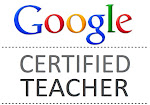Originally published by Howard Rheingold on DML Central (Digital Media and Learning)
and the National Writing Project
* * * * *
Usually Mrs. Yollis and her students are conducting, or carrying out interviews. Today, the interview will feature Mrs. Yollis. She was recently contacted by the great teacher and writer,
Howard Rheingold. He was interested in learning about how Mrs. Yollis teaches young children to build a positive digital footprint through educational blogging.
Here is Mr. Rheingold's interview:
Mr. Rheingold writes:
Blogging, commenting thoughtfully on others’ blogs, staying safe online, creating a positive digital footprint, using audio and video to connect with students in other parts of the world, creating and publishing video – at what grade level should students be introduced to these essential digital literacies? How about the second and third grade? Linda Yollis, a teacher in Los Angeles’ San Fernando Valley, remembers the classroom in which she started teaching in the 1980s: “Learning was confined to the four walls of the classroom, was entirely paper-based, worksheet-driven, and I was the audience for most of the written work in this classroom; parents found out what was going on by reading the newsletter that I would send out and maybe by looking at the graded projects their children took home. All of the learning took place between eight and three. I had a very closed classroom. That all changed in 2008 when I started blogging. Having a class blog has flattened the walls of this classroom. Now we have an online space where students, parents, and other classrooms all over the world can come together in an online learning community.”
Mrs. Yollis not only teaches her second and third graders to blog (some of whom came into her class with blogging experience from Mrs. Levy’s first grade blog), she teaches them – and her students make videos to teach others – about raising the level of online discourse through quality blog comments. Take a look at Mrs. Yollis’ introduction to blog commenting and ask yourself whether the online commons could become a much better place in a few years if more second and third graders were introduced to online discourse in this way. She even introduced a rubric for blog comments that eight year olds can understand: “A one-point comment is a general comment that doesn't add very much to the post. Example: I like your blog. Please visit mine! A two-point comment adds something to the comment conversation. A commenter might compliment the writer in a specific way or add new information. Another idea is to make a connection. Maybe the post reminds you of an experience that you've had. Share that connection! Try to end your comment with a relevant question. That way, an interesting conversation can develop.”





















